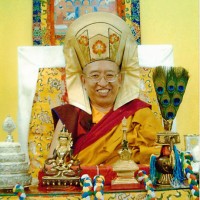There are two different ways in which we can understand the term “ordinary mind.” One way is to not take control over anything and end up following our afflictions. When a thought of anger arises, we follow it; when greed arises, we lose control of ourselves to it. Similarly, we lose control of ourselves to our pride and jealousy. Although we might think of this as our ordinary state of mind, it is not what we mean here. Here it does not mean losing control of ourselves to negative emotions. Instead, it means that we do not need to do anything at all to the essence of the mind itself.
We do not need to alter this essence in any way. We do not have to worry about what we are thinking, what is pleasant, or what is painful. We can leave this mind as it is. If we try to alter the mind in any way, thoughts will arise. But if we do not do anything to it and let it rest easily, then it is unaltered. The Kagyu masters of the past called this the ordinary mind, or the natural state. They called it this out of their experience. This ordinary mind itself is the dharma expanse and the essence of the buddhas; it is our buddhanature.

Thrangu Rinpoche
from the book Vivid Awareness: The Mind Instructions of Khenpo Gangshar
translated by David Karma Choephel
Read a random quote or see all quotes by Thrangu Rinpoche.
Further quotes from the book Vivid Awareness:
- Not rooted in anything
- Thinking while resting in the natural state
- Thoughts are just displays of the mind
- Virtuous and Non-virtuous Actions
- Confused appearances
- Taking Pain and Illness as the Path
- Karma
- Mind and brain
- The most important thing
- Looking at the essence of delusion
- Awareness is naturally liberated
- The essence of afflictions
- Goodness is something we all have
- Resting within the essence of the mind